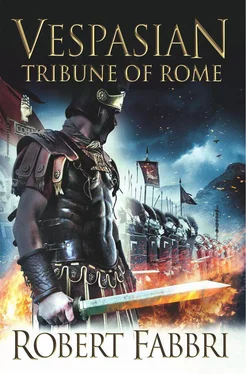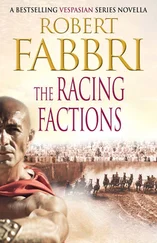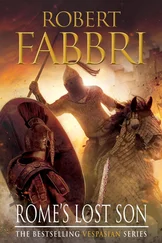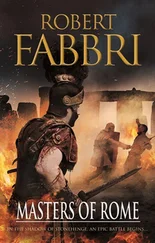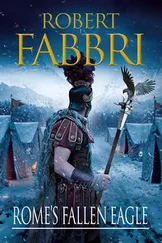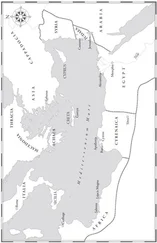Robert Fabbri - Tribune of Rome
Здесь есть возможность читать онлайн «Robert Fabbri - Tribune of Rome» весь текст электронной книги совершенно бесплатно (целиком полную версию без сокращений). В некоторых случаях можно слушать аудио, скачать через торрент в формате fb2 и присутствует краткое содержание. Жанр: Исторические приключения, на английском языке. Описание произведения, (предисловие) а так же отзывы посетителей доступны на портале библиотеки ЛибКат.
- Название:Tribune of Rome
- Автор:
- Жанр:
- Год:неизвестен
- ISBN:нет данных
- Рейтинг книги:3 / 5. Голосов: 1
-
Избранное:Добавить в избранное
- Отзывы:
-
Ваша оценка:
- 60
- 1
- 2
- 3
- 4
- 5
Tribune of Rome: краткое содержание, описание и аннотация
Предлагаем к чтению аннотацию, описание, краткое содержание или предисловие (зависит от того, что написал сам автор книги «Tribune of Rome»). Если вы не нашли необходимую информацию о книге — напишите в комментариях, мы постараемся отыскать её.
Tribune of Rome — читать онлайн бесплатно полную книгу (весь текст) целиком
Ниже представлен текст книги, разбитый по страницам. Система сохранения места последней прочитанной страницы, позволяет с удобством читать онлайн бесплатно книгу «Tribune of Rome», без необходимости каждый раз заново искать на чём Вы остановились. Поставьте закладку, и сможете в любой момент перейти на страницу, на которой закончили чтение.
Интервал:
Закладка:
Kratos gulped. ‘Yes, but I won’t, I swear on my life.’
‘I don’t believe you.’ Vespasian thrust his sword up through Kratos’ chin and into his brain. His eyes popped wide open in surprise and then his body went limp.
‘Let’s get out of here before the army and Poppaeus get back,’ Vespasian said, wiping the blood off his sword on the secretary’s tunic. He looked at the lictors. ‘Take your master’s body and ride as fast as you can to Philippopolis. You can cremate him there, but do it quietly. Then, when you get back to Rome, go and see the Lady Antonia; I shall make arrangements for your loyalty to be repaid. Rhoemetalces, you go with them to help; we need to make sure that Asinius’ death is kept secret for as long as possible.’
‘Why?’ the King asked, getting painfully to his feet.
‘Because when Poppaeus finds that the letters are missing, he’ll come straight here, where he will find six of Asinius’ lictors, his secretary Kratos, Hasdro and his mates all dead. But he won’t find Asinius or the letters. He’ll assume the worst and will have two choices: suicide; or go back to Rome and hope for the best. Neither of them will be very attractive to him. You must get your mother to write to Antonia and tell her everything. If Antonia can make Poppaeus believe that she has the letters, she may be able blackmail him into feeding her information about Sejanus, and Asinius’ sacrifice won’t have been in vain.’
‘But what happens when Poppaeus finds out that Asinius is dead?’
‘It won’t matter, as long as he doesn’t find out he died here, which he will if he comes back to find us still talking about it. Now go!’
The lictors quickly picked up Asinius’ body and covered it with a blanket. Vespasian led them hurriedly through the deserted camp to the horse-lines where they strapped the corpse onto the back of a horse. In the distance the hubbub of the army receiving its bounty could be clearly heard.
As he watched Rhoemetalces and the lictors race out of the camp, taking with them the evidence that could put Poppaeus’ mind at ease, Vespasian felt an overwhelming sense of relief; he was in a game of very high stakes and, although the victory was not complete, he was still alive. He remembered the words he had overheard his mother saying: ‘He will have the Goddess Fortuna holding her hands over him to ensure that the prophecy is fulfilled.’ He would make a sacrifice of thanks to Fortuna to ensure her continued protection. He looked at Magnus and smiled. ‘Quick, my friend, let’s go,’ he said, jumping onto a horse.
‘Where to sir?’
‘Firstly to find some water to clean you up and then, like Asinius said, we make ourselves scarce for a couple of days until Poppaeus is well gone.’
‘Suits me fine, but what then?’
Vespasian shrugged and kicked his horse forward. ‘Who knows? Whatever the army wants, I suppose.’
AUTHOR’S NOTE
This is a work of fiction based upon the histories of Suetonius, Tacitus and Cassius Dio. Most of the characters are real; of the principle ones the exceptions are: Magnus and his mates, Rhoteces, Hasdro, Faustus, Atallus, Coronus, Kratos and Pallo. As this is historical fiction and not history I have taken some liberties with a few of the characters. There is no evidence, to my knowledge, that either Corbulo or Paetus served in Thrace whilst Vespasian was there; however, as theirs and the Flavian brother’s offspring inter-marry I thought that it would be a good time to introduce them into the story. I must offer my apologies to the descendants of Poppaeus; his intrigue with Sejanus is purely the work of my imagination and there is no reason to suspect that he was ever more than the reliable but unremarkable man that Tacitus describes him as; indeed, had he been more than that it would have been most unlikely that Tiberius would have kept him in position for so long or had awarded him triumphal ornaments in AD26 for the defeat of the Thracian rebellion.
The details of the Thracian revolt are taken from Tacitus and it happened pretty much as described in the book with the glaring exception of the attack by the Thracian women. Tacitus mentions their presence that night on the field as bystanders, cheering their men along. They were too much of a temptation to have just standing idly by and I couldn’t resist having them charge.
The Roman army system of signalling that I have used I extrapolated from two excellent books: John Peddie’s “The Roman War Machine” and Adrian Goldsworthy’s “The Complete Roman Army”. Any mistakes are my own. In order to keep it reasonably simple I have ignored the Tuba – mainly because the word conjures a different image in the modern mind than what it really looked like – and used the Bucina for signals within camp and the Cornu for signals on the march or in battle; the Lituus I have left in its rightful place with the cavalry. This will, I hope, not annoy the purists too much.
I have taken the dating of Vespasian’s career, throughout the series, from Barbara Levick’s biography of him entitled simply “Vespasian”. She points out rightly that Vespasian probably arrived in Thrace soon after the rebellion was over and would have spent three or four years on boring garrison duty; but where’s the fun in that? So I brought his arrival forward by a few months to ensure that he was a part of the action.
The omens surrounding Vespasian’s birth are all taken from Suetonius who was very keen – as were most Romans – on that sort of thing and took it very seriously. Suetonius provides Tertulla’s remark to Titus concerning him going senile before her when he claims that the omens show that Vespasian is destined for greatness; as well as Vespasia’s remark to Vespasian about always living in his brother’s shadow when he refuses to embark upon a career in Rome. He also mentions Tertulla’s silver cup and states that Vespasian kept it after her death and always drank from it on feast days.
For brevity’s sake I have used just one name of each of the real characters once they have been introduced and for clarity’s sake I have felt free to use whichever one I fancied so as not to end up with too many people called Titus or Sabinus. The only name that I’ve left in its anglicized form is Vespasian who should of course be Vespasianus.
Caenis and Pallas were both in Antonia’s household and Caenis was her secretary so would have known the contents of those scrolls had they really existed – and who’s to say they didn’t? Whether she was descended from the Caenii – or Kaenii as it is spelt on some old maps – is debateable, but to my mind it seems likely.
When I claim that Antonia was the most powerful woman in Rome it is not strictly true; Augustus’ widow, Tiberius’ mother, Livia was still very much alive and involved in politics but she died in AD29 before Vespasian returned from Thrace so I decided to leave her out. It was through Antonia that Vespasian received preferment due, in part, to his relationship with Caenis which lasted until her death in AD75.
Antonia’s assertion that Gnaeus Calpurnius Piso was responsible – perhaps with Tiberius’, Livia’s or Sejanus’ connivance – for the poisoning of her son, Gemanicus, was accepted by most historians in the Roman world; his suicide before the end of his trial proving his guilt. Robert Graves puts forward another theory in “I, Claudius”; if you want to read an interesting conspiracy theory I recommend Stephen Dando-Collins’ “Blood of the Caesars”.
Exactly when and how Vespasian met Caligula is not recorded; however, due to his ties with Antonia, Vespasian would almost certainly have come into contact with him.
Asinius was consul in AD25 and did die the following year but how and where we don’t know; however, the fact was very convenient for the plot. His being in league with Antonia against Sejanus is my invention but is not unlikely.
Читать дальшеИнтервал:
Закладка:
Похожие книги на «Tribune of Rome»
Представляем Вашему вниманию похожие книги на «Tribune of Rome» списком для выбора. Мы отобрали схожую по названию и смыслу литературу в надежде предоставить читателям больше вариантов отыскать новые, интересные, ещё непрочитанные произведения.
Обсуждение, отзывы о книге «Tribune of Rome» и просто собственные мнения читателей. Оставьте ваши комментарии, напишите, что Вы думаете о произведении, его смысле или главных героях. Укажите что конкретно понравилось, а что нет, и почему Вы так считаете.
